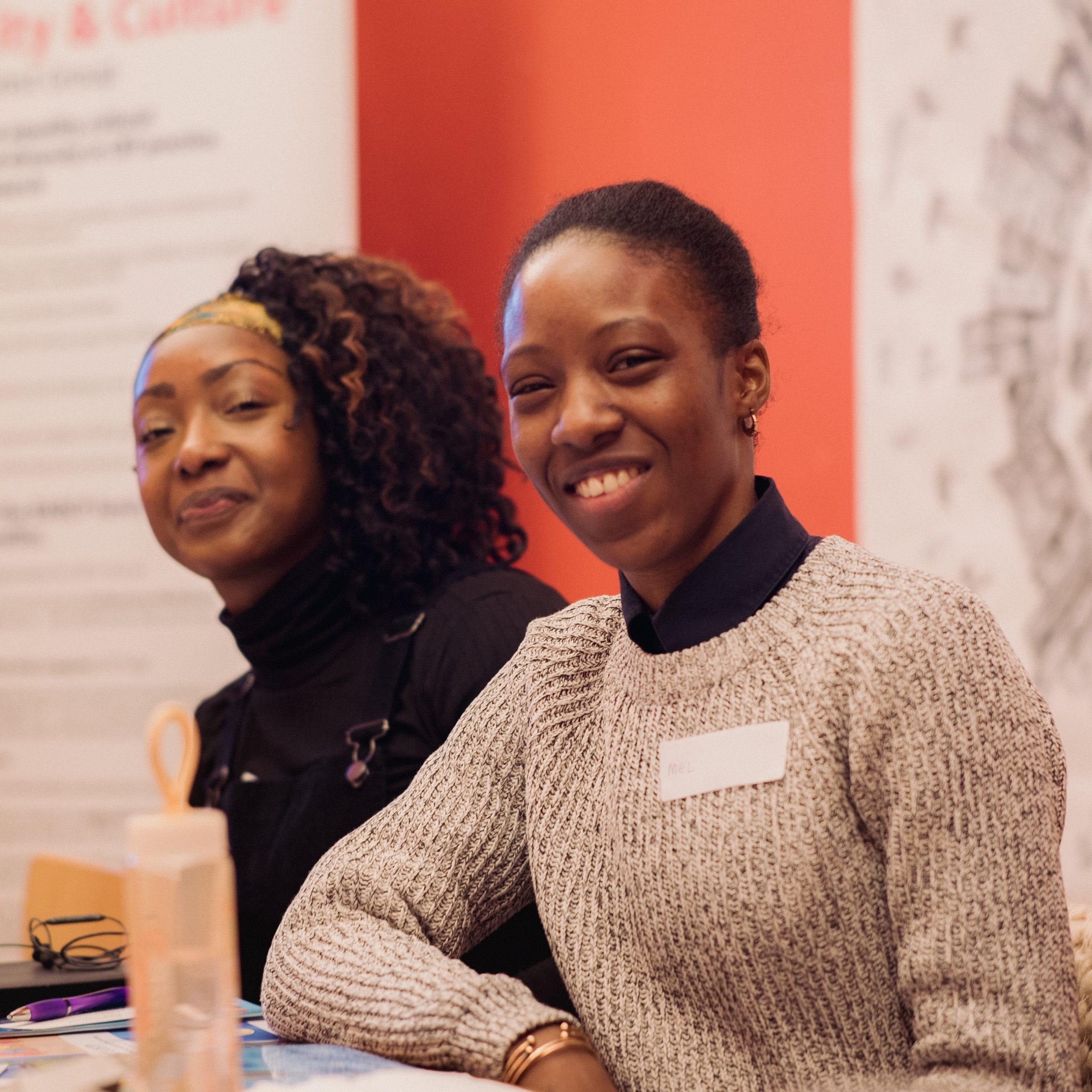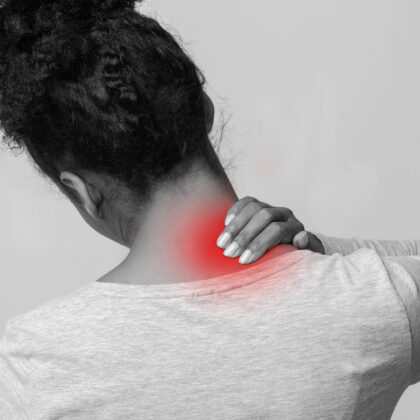Processing pain whilst pushing for progress, back of the queue and frontline. CBT for African & Caribbean communities.
The December BABCP Article of the Month is from the Cognitive Behaviour Therapist and is entitled “Frontline yet at the back of the queue – improving access and adaptations to CBT for Black African and Caribbean communities” by Leila Lawton, Melissa McRae and Lorraine Gordon
The thirst for us to write this paper extends beyond our professional roles having witnessed (and continuing to witness) the devastating consequences of poor mental health within our Black African and Caribbean families and communities. The personal is both the political and psychological.
In the pandemic the world awakened to racialised injustice through the amplified lens of social media. A high proportion of key workers from global majority populations are front line, yet at the back of the queue. 2020 saw many people from racially minoritised communities disproportionately affected by COVID deaths (which includes a significant percentage of NHS Health and social care staff). We, like thousands of others, have lost several close loved ones whilst completing this piece. COVID enveloped a nation still reeling from and living in the aftermath of Brexit and the scandal inflicted on the Windrush generation.
Activism thirst hits you like a drug.
The events of the past eighteen months have shaped our way of life in ways we could never have predicted. These events have highlighted the importance of local, national, and international contexts for idiosyncratic formulation and psychological intervention. The Global North ‘WEIRD’ (White – Educated – Industrialised – Rich – Democratic) dominate population samples within psychology, psychotherapy & Cognitive Behavioural Therapies evidence base. It is important for us to consider not only the history of both psychotherapy and CBT but also more recent work regarding advances in cultural humility in CBT.
The 1940 Dolls test by Dr Mamie Clark poignantly presents the harsh realities of conditioning of racialised identities very early on. Recent recorded re-enaction’s of the ‘Dolls Test’ evidence little change and heart-breaking despair of young racially minoritised children where they have already learned that their identities are marked and ascribe to believing that they are inferior. Where does it come from? Our History directly influences our present and unfortunately, we have not moved on enough because systemic racism is endemic in every structure of society.
This is not comfortable reading, but the crushing of George Floyd’s precious neck has created opportunities for bluntness on these topics. Whilst we worked on the paper, the viral videos of his traumatic demise provided new permission to speak publicly on racism. Implications of inequality are severe and enduring mental health difficulties for the racially minoritised in the UK, who in less desired sections of society, are the majority. Societal position on the last rung of the ladder with metaphorical hands & feet tied. Numerous broken lives, societal positioning of identities further amplified.
Through this process, we have grieved the many lost, the high cost of injustice and an unequal world. We are becoming brave enough to use the word ‘racism’ in clinical spaces to white faces.
Racism speak can often be met with defiance, non-compliance or enforced neutrality. Oppression and historical context cannot be questioned. In their multi-layered forms micro-aggressions seek to undermine and keep US towed in line. They’ve become the norm. No more regression. Before the language to define micro aggressions was established the bewilderment and self-doubt from these harmful slights caused recipients to question their reality. Their frequency as common as mosquito bites on a hot summer’s night.
The BABCP has taken a clear anti-racist stance – but what does that mean for individual CBT therapists, supervisors, and trainers?
We explore uncomfortable territory and invite the workforce to embrace the discomfort of discussions on whiteness; the social construction of race, and the implication of systemic and structural racism on the communities that we serve. If we can accept that White South Africans have rights to be recognised as African, then our footballer’s British status should not be dependent on their performance. Mental health services need to accept, understand and manage the effects of legacies of oppression and racism on our British shores. Cricket is another area where this was recently exposed.
Repetitive statistics highlight the prevalence of poorer outcomes in mental/physical health for the African and Caribbean communities are not coincidental. Neither can they be accepted as the status quo or seen as intrinsic to this ethnicity. The risks of common mental disorder are higher, access to culturally appropriate mental health provision lower. In addition to less opportunities for progression within educational and employment systems. With more challenging socio-economic conditions, whether first, second, third or fourth generations.
Andrew Beck’s fantastic book on transcultural CBT demonstrates how CBT requires adaptation for culture and context (Beck 2016). The 2019 IAPT BAME Positive Practice Guide endorses cultural adaptations (Beck et al, 2019). CBT idiosyncratic models can be adapted to centre difficulties within the context of social constructions of whiteness and race.
This article is about understanding the need for research to be targeted to different racially minoritised communities. Although the dominant group, whiteness is not the gold standard and everything else is a ‘deviation from the norm’. All systems are infiltrated by this, and racism has been proven to have detrimental impacts on mental health. There is much diversity within groups despite shared characteristics. For therapists working within communities can provide opportunities for reciprocal learning, developing knowledge of Afro and asiancentric approaches to mental health.
In this era, we are creating platforms for new narratives, highlighting creativity, achievements, and contributions from racially minoritised communities. Overt, covert, systemic, structural, individual, or otherwise racism and discrimination kills, too many lives have been crushed and lost.
Processing the pain of individual and collective loss, the BAME Positive Practice Guide is pushing for progress. Formal frameworks to enable its compulsory dissemination and IAPT Key Performance Indicators on access, experience, and outcomes for racially minoritised communities are long overdue.
Silence or inaction no longer able to be endured
From Richard Thwaites, the Editor-in-Chief of tCBT: Why I chose this article:
CBT has developed a strong evidence base over the years for a whole range of problems but this has at times been at the expense of considering wider societal context (whether this is routinely including the surrounding environment or patient culture in formulations or in the consideration of service delivery issues where very different access, recovery and patient experiences for some minoritized ethnic groups are a major cause for concern. This powerful paper provides an overview of some of the issues with respect to Black African and Caribbean communities and is essential reading particularly for staff working in IAPT services and highly recommended for those working in secondary care where there is often less complete collection of ethnicity data and therefore potentially less transparency regarding differential outcomes for specific groups.
Author Bio:

Leila is a mother of 4, visiting lecturer at King’s College London IoPPN, accredited Cognitive Behavioural Psychotherapist, Clinical Supervisor, Equity Activist, trainer, Chair of BABCP Equality & Culture Special Interest Group and the South London & Maudsley NHS Trust psychology & psychotherapy (P&P) race equity working group. Leila’s passion for people and inclusive clinical and research practice has been cultivated through 16 years combined experience within primary, secondary care and the third sector. Enhancing effectiveness of implementation of culturally congruent therapies. She is committed to utilising education as a tool to develop solutions in addressing systemic and structural racism, increasing BAME research participation and shaping policy for meaningful change.







its a nice thing that you have shared
I just like the valuable information you supply with your articles.
Thanks For Sharing That Amazing Information Here With Us!
Thanks for sharing nice information’s.
Thanks For Sharing That Amazing
Thanks for sharing nice
Thanks for sharing this is a really good article!
Hope you are doing well. I am very thankful to you for providing this information.
Thank You For Sharing The Informative Article..
Great Article and thanks for sharing
is the best blog